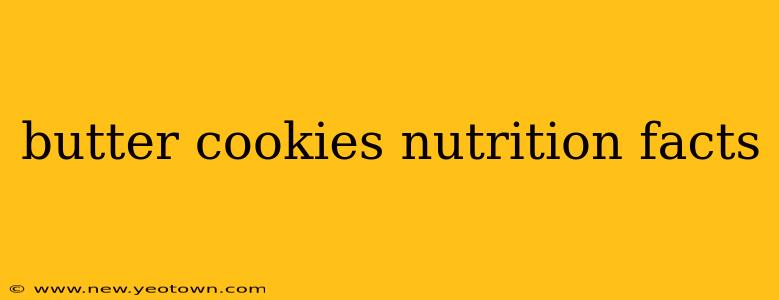Ah, butter cookies. The delicate crunch, the melt-in-your-mouth texture, the irresistible buttery aroma… they're a classic for a reason. But beyond the sheer enjoyment, what's the nutritional story behind these beloved treats? Let's dive into the world of butter cookies and explore their nutritional facts, addressing some common questions along the way.
What are the typical nutritional values of butter cookies?
This is where things get a little tricky. The nutritional profile of a butter cookie can vary wildly depending on the recipe and the specific ingredients used. A simple butter cookie made with just butter, flour, sugar, and perhaps a pinch of salt will differ significantly from a more elaborate version studded with chocolate chips, nuts, or filled with jam.
However, we can offer a general guideline based on a typical, simple butter cookie. A single, average-sized (about 1 ounce) butter cookie might contain approximately:
- Calories: 100-150
- Fat: 6-8 grams (often mostly saturated fat from butter)
- Carbohydrates: 15-20 grams (mostly from flour and sugar)
- Sugar: 6-10 grams
- Protein: 1-2 grams
It's crucial to always check the nutrition label on the specific brand or recipe you're consuming. These numbers are estimates, and variations are common.
Are butter cookies high in sugar?
Yes, butter cookies are generally high in sugar. Sugar is a key ingredient in creating the characteristic sweetness and texture. The exact amount varies, as mentioned, but a significant portion of the carbohydrates in a butter cookie comes from added sugar. If you're watching your sugar intake, it's best to enjoy butter cookies in moderation.
How many calories are in a butter cookie?
The calorie count per cookie can fluctuate greatly depending on size and ingredients, ranging from approximately 100 to 150 calories per cookie. Factors like added nuts, chocolate chips, or a larger cookie size will increase the caloric content.
What are the main ingredients in butter cookies?
The core ingredients in most butter cookie recipes are relatively simple:
- Butter: Provides the characteristic flavor and richness.
- Flour: The structural base of the cookie.
- Sugar: Adds sweetness.
- Eggs (sometimes): Bind the ingredients and add richness.
- Salt: Enhances flavor.
Variations will often include vanilla extract for added flavor, and as mentioned earlier, ingredients like chocolate chips, nuts, or dried fruits can be added for extra flavor and texture.
Are butter cookies healthy?
This is a subjective question with no easy answer. Butter cookies are not a health food. They are high in fat, sugar, and refined carbohydrates. However, enjoyed occasionally as part of a balanced diet, they aren't inherently "unhealthy." The key is moderation. Don't rely on butter cookies as a regular part of your diet, but an occasional indulgence won't derail your health goals.
Can I make healthier butter cookies?
Absolutely! There are many ways to adjust a butter cookie recipe to make it slightly healthier:
- Reduce sugar: Use less sugar or substitute with a healthier sweetener like honey or maple syrup (though this will alter the taste).
- Use whole wheat flour: This adds fiber and nutrients.
- Add nuts or seeds: Boosts the nutritional profile with healthy fats and fiber.
- Reduce butter: Use a little less butter, but be aware this might affect the texture and taste.
Ultimately, butter cookies are a treat best enjoyed in moderation. Understanding their nutritional profile allows for informed choices and mindful consumption. Enjoy them, but savour each bite!

